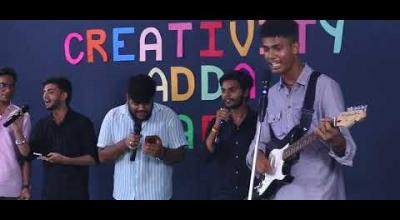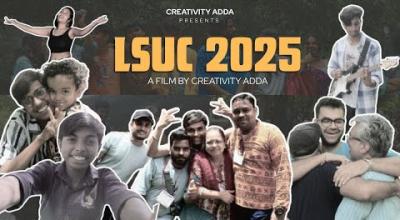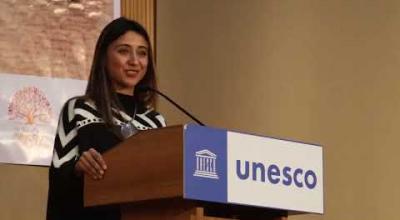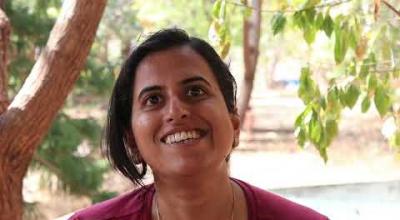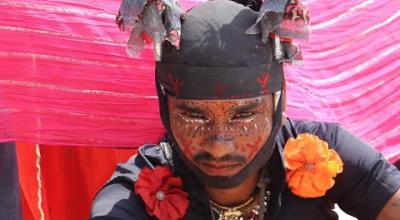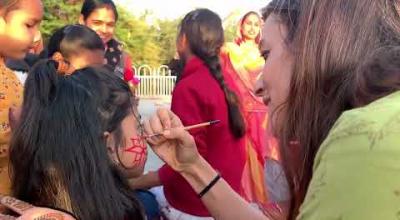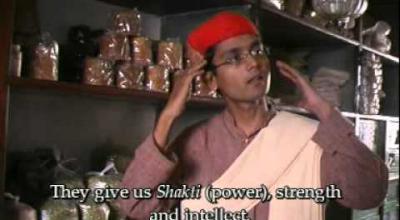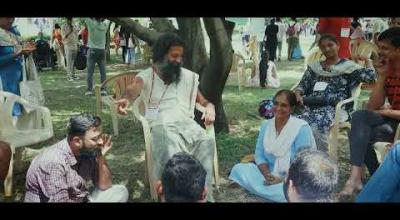100 educational leaders came together on March 14-15, 2024 for the Creativity in Education Conference at Delhi which was hosted in collaboration with UNESCO Delhi, shikshantar sansthan, new earth foundation, digital empowerment foundation and DS group.
INDIAN CREATIVITY CONSORTIUM
Creativity in Education Press Release
On March 14-15, 2024, a diverse group of educational leaders and organisations came together in the capital city of New Delhi to co-host the first-ever national ‘Creativity in Education Conference’. Creativity has been recognized across the world as a key 21st century learning skill for the future of learners, companies and nations. It even features very prominently in the new National Education Policy. Despite this, there remains a large gap between the intention and its implementation on the ground. The purpose of the Conference was to share experiences, pedagogies, and conversations around the core challenge of “How can we work together to create more opportunities for enhancing the creativity of children and communities in the Indian education system?” The Conference was co- hosted by Shikshantar Sansthan, New Earth Foundation, DS Group, Digital Empowerment Foundation in partnership with UNESCO-Delhi.
Launch of the Indian Creativity Consortium across the nation
The Conference opened with a pre-conference event which brought together of more than 50 education visionary-practitioners (from Swaraj University, Piramal Foundation, Project DEFY, The Dharavi Dream Project, Slam Out Loud, Makers Asylum, Khilkari Angan, Karm Marg, Manzil, Prakriti School, FabIndia School, Puvidham School, The MoveVent Project, SEE Learning, Kanthari, and more) in Creativity Adda, Mukherjee Nagar Boys Senior Secondary School on the first day. The Creativity Adda (a creativity-focused learner-led space situated inside a Delhi government school) was a unique and poetic space for all creativity stalwarts to synergise their ideas and creative forces. The day opened with the Creativity Adda on display as the young learners of the Adda took it upon themselves to host the guests and show them around the learning spaces that were bursting with creativity, inspiration, and jugaad. The creativity of the learners carried over to lunch when the young chefs from the Creativity Adda Slow Food Academy impressed the guests with some mouth-watering millet dishes.
Post some energy-evoking exercises, the practitioners reflected on the various processes and outcomes of creativity they witnessed within the Adda and also their own organisations and programs. This was followed by breakout group discussions and experience sharing on creativity and healing, creativity and culture-building, and creativity and problem solving/innovation. Each of these discussions brought forward deeply-nuanced, practice-led solutions to the crisis of creativity in the education sector. This was followed by conversations focused on the need to introduce freer learning pedagogies, the role of technology within formal and informal learning spaces in enhancing or reducing opportunities for creative expression, the need for diverse forms of assessment to recognize and appreciate creativity, and the role of architecture, built environments and natural environments in nurturing creativity. There was a strong recognition for the need to more closely look at and adapt traditional knowledge systems of indigenous and rural communities when speaking about a new paradigm of creativity.
The sessions were followed by the Music Hub learners of the Creativity Adda presenting a medley of energetic Sufi and qawwali songs and closing remarks by Manish Jain, the co-founder of Swaraj University, about the vision behind the Indian Creativity Consortium and the need for collaboration between educational visionaries across formal and non-formal education setups.
The second day’s events were held at the UNESCO-Delhi auditorium in Chanakyapuri. The conference opened with an outdoor learning festival which featured several practical models of how creativity was being nurtured around the country. It became clear to all the participants that many inspiring models for nurturing creativity had already been developed and eectively implemented on the grassroots level around the country.
The inaugural session began with powerful songs from Mast Malang Band students from Creativity Adda. Opening remarks were then by Joyce Poan, the Chief Education Ocer and Programme Specialist, who shared, “Creativity is critical for the future of India and for the world.” She stressed the urgent need for more culture and arts education in the education system, starting with teacher training. She shared that the next 6th Edition of UNESCO’s State of Education report also will be focused on identifying best practices and policy recommendations for arts education. Next Khrisha Ambani, New Earth Foundation, reminded us that creativity is not just limited to artists and painters but is also applicable to future engineers, managers and changemakers. She highlighted the need to connect our creative pursuits with ethics and her concern about the financialization of creativity whereby creativity will be increasingly limited to only those endeavours which are only commercially lucrative. Manish Jain shared, “One of the reasons creativity has been ignored by the education system is that it is very hard to measure. Educators and society usually have only focused on the outputs or results. But the process and the underlying conditions, including space for daydreaming and the space for prototyping, iterating and failing, are extremely important.”
The keynote address was delivered by Rajendra Singh, Waterman of India, who has worked to ignite the creativity of rural villages to solve severe water problems across India. He spoke about the need for educators to learn from traditional communities and their knowledge-learning systems, “The forests and the people living in them are creative by design, their practices and ideas are rooted in knowledge that is flexible, regenerative and deeply community-oriented in comparison to formal state-led education that values profit-oriented living and consumption.” Tripura Kashyap, founder of Creative Movement Therapy Association of India, closed by oering a short movement exercise to the group as a live example of her work to bring attention to the powerful role creative expressions play in healing and therapy practices.
In the afternoon session, KB Jinan, cognitive researcher and designer, spoke extensively about the destruction of creativity and innovation unleashed by the rigid and insensitive education system and practices. He said, “We must focus on play and noted that we should learn from indigenous communities who would suggest we look at ‘toying’ as a verb to highlight the continuous knowledge production process rather than just on toys.” Miti Desai, classical dancer, educator and designer, went on to share that the classical art traditions invite us to slow down, meditate, contemplate and focus on the processes of visualization when entering into creative explorations.
Dolly Rateshwar, co-founder of the Dharavi Dream Project in Mumbai, shared, “We (organisations, practitioners) need to handover the creative forces to the learners, we have to handover agency and power so that children are free to be creative, dare to explore, and collaborate across communities.” Ravi Gulati, founder of Manzil Learning Center in Delhi, noted that, “We need to support both a culture of freedom and discipline. Mridul Batra, the co-founder of Prakriti School in Noida, added, “There is a dierence between teaching and facilitation. Teaching is rigid whereas facilitation involves emotions and feelings. We make space for children to explore through facilitation, which makes space for feeling and emotion-led learning.” Puneet Bhatnagar, founder of Creativity Commandos and creativity trainer for corporates and colleges elaborated on out-of-box thinking, “Our creative forces have been suppressed, it is time to expand our thinking and reclaim that magic. One of the ways to do
it is to enter and learn from other worldviews, expand the idea of what can be possible and find new ways of doing everything, better ways.” He went on to share, “We all have our boxes. Creativity means having the capacity to venture into other people’s boxes.” The conversations were thought provoking and provided valuable insights for the launching of the Indian Creativity Consortium.
Manish Jain concluded the day’s event with the launch ceremony of the Indian Creativity Consortium. He shared that the aim is to raise Rs100 crore to launch 100 creativity labs across the country. These labs will support local multi-sectoral teams to work together to inspire, establish and encourage creativity-focused models across schools, neighbourhoods and communities. He concluded by sharing, “We have not come to this earth to compete with each other, we are here to complete each other. In that spirit, we practitioners of formal, non-formal adult-and children-led learning spaces, schools, companies, government bodies and civil society organisations must join forces to prioritise creativity as a response to the ongoing crises in the overall well-being of society and the planet. We hope that the Indian Creativity Consortium will be a movement for us to collaborate and incubate inspiring creativity-based learning models across the country.”
Contact: Manish Jain, Shikshantar Sansthan, <manish@swaraj.org>
RECORDED TALKS
Joyce Poan - https://www.youtube.com/watch?v=kSM7tbPzJJ4 Khrisha Ambani - https://www.youtube.com/watch?v=R5niivsaAVo Manish Jain - https://www.youtube.com/watch?v=oYUFfdiJhb4 Rajendra Singh - https://www.youtube.com/watch?v=jd9kVI0oPzY Jinan KB - https://www.youtube.com/watch?v=M-UaP81wko0
Miti Desai - https://www.youtube.com/watch?v=Bklgal_w0NY
UNESCO Day - https://www.youtube.com/watch?v=QytBYzhip4o&t=13s Creativity Adda Day - https://www.youtube.com/watch?v=x_JyqKTO8L8
LIST OF ATTENDEES
- Rajendra Singh (Waterman of India, Tarun Bharat Sangh)
- Manish Jain (Shikshantar, Swaraj University and Creativity Adda) - Abhijit Sinha (Project DEFY)
- Dolly Rateshwar (Dharavi Dream Project)
- Naman Goel (Slam out Loud)
- Nandini Sood (Design for Change)
- Vaibhav Chhabra (Maker’s Asylum)
- Maneesh Mishra (Piramal Foundation for Education Leadership) - Sandeep Kumar (Piramal Foundation for Education Leadership) - Mridu Sahai Patnaik (The Design Village)
- Vidhi Jain (Shikshantar Sansthan, Udaipur as a Learning City)
- Sumit Bhale (Swaraj University)
- Harsh Wardhan (Swaraj University)
- Ashish Sharma (Swaraj Jail University)
- Harish Srinivasan (IE Skool Makerspaces)
- Jatan Shekhawat (Dhun Learning Center)
- Veena Lal (Karm Marg)
- Uma Rawat (Manzil Welfare Society)
- Paul Kronenburg (Kanthari)
- Ashish Tiwari (Creativity Adda)
- Amit Tiwari (Creativity Adda)
- Antara Mukherjee (Creativity Adda)
- Amena Bal (Global Ecovillage Network)
- Mridul Batra (Prakriti School)
- Meenakshi Umesh (Puvidham School)
- Sandeep Dutt (Good Schools Alliance and FabIndia School)
- Ravi Gulati (CreateNet Learning and Manzil Welfare Society)
- Abhishek Thakore (WisdomTree)
- Saptarshi Dasgupta (Torus Edu)
- Anish Singh (National School of Drama-Theatre in Education and Shiv Nadar School) - Reva Dandage (Anubhooti Democratic School, Pune)
- Subhash Chandra Bose (Delhi Government School Principal)
- Sagareeka Bhatia (Roundglass Sports School)
- Peter Lauenstein-Denjongpa (Sikkim Emerging Ecosystems)
- Kunzang Choeki Bhutia (Khelum Foundation and Sikkim Charter School)
- Tathagata Bandyopadhyay (DA-IICT)
- Jyoti Parihar (Kilkari Bihar Bal Bhawan, Patna)
- Zoya Singh (Artist and Storyteller)
- Miti Desai (Miti Design Lab and Classical Dancer)
- Neha Kudchadkar (Innovation Champions Club Online)
- Kiran Reddy Avuthu (Helm of 8 Impact Ventures)
- Puneet Bhatnagar (Creativity Commandos)
- Tripura Kashyap (Creative Movement Therapy Association of India)
- Shubham Srivastav (MoveVent Movement Therapy and Aham: Celebrating Self Festival) - Neha Bhatia (SEE Learning)
- Kabir Vajpeyi (VINYÃS:Centre for Architectural Research & Design)
- Gouravaram Rajashekar (Greatgameindia)
- K Chandrasekhar Reddy (Greatgameindia)
- Lavanya NK (Jaipur Rugs Foundation)
- Christoph Neusiedel (Knoedel Foundation)
- Stéphane Amalir (Alliance Francaise)
- Khrisha Ambani (New Earth Foundation)
- Drona Chetri (New Earth Foundation)
- Anugrah Bhatt (New Earth Foundation) - Prabhakant Jain (DS Group)
- Mili Shah (Bisleri Foundation)
- Ram Boojh (Mobius Foundation)
- Shivani Singhal (Dharohar Foundation and Third Space) - Vicky Bedi (Philanthropist)
- Kajoli Khanna (Philanthropist)
- Karan Maker (Philanthropist)
- Abner Manzar (Digital Empowerment Foundation)
- Atul Srivastav (Adobe Corporation and Forest Iskool)
- Javed Khan (DS Group)
- Pranita Ghalay (DS Group)
- Shikha Jain (USAID Education Team)
- Mandeep Kaur (Embassy of the United States of America) - Stephane Amalir (Alliance Francaise)
- Vishishta Sam (UNICEF)
- Pankaj Pushkar (exAAP MLA)
- Radhika Bordia (former NDTV senior journalist)
- Priyank Sharma (ITARI and NIEPA researcher)
- Leroy Rebello (Biotex)
- Revant Himatsingka (Food Pharmer)
- Sethu Shah (Prose Integrated)
- Yohan Tengra (Researcher)
- Satya Bhushan (NCERT)
- Varada Mohan (NCERT)
- Nisha (Department of Education, Delhi)
- Salil Sahadevan (University Grants Commission)
- Jinan (Existential Knowledge Foundation)
“A creative life is an amplified life. It's a bigger life, a happier life, an expanded life, and a hell of a lot more interesting
life.” – Elizabeth Gilbert
PROGRAM FLOW
March 14th Pre-conference @ Mukherjee Nagar Senior Secondary School - Creativity Adda
12:00pm-12:30pm - Welcome
12:30pm-1:30pm - Visit and Interact with the Creativity Adda students and team 1:30pm-2:30pm Lunch
2:30pm-4:30pm Interactive Session: Exploring Creativity in Our Lives and Projects
Personal Story Sharing
Interactive session: Creativity and Healing, Creativity and Problem-Solving, Creativity and Arts Cultural Regeneration, Social Change
4:30pm-5:00pm Tea
5:00pm-6:00pm Interactive Session: Re-Designing Education for Creativity (Assessments, Research, Spaces, Technologies)
6:00pm-7:00pm Discussion about Indian Creativity Consortium 7:00pm-7:30pm Closing Session
7:30pm-9:00pm Dinner in Mukherjee Nagar
March 15th Conference @ UNESCO oce, Chankyapuri, Delhi 10:00am-10:30am - Registration
10:30pm-12:30pm - Creativity in Education Innovations Mela featuring 20 Initiatives 12:30pm-1:00 pm - Welcome Session
(Mast Malang Student Band, Joyce Poan, Khrisha Ambani, Manish Jain) 1:05pm-1:30pm - Keynote Speech by Rajendra Singh)
1:30-2:30 pm - Lunch and Games
2:30pm-3:30pm - Session: What are our indigenous visions of Creativity?
Provocateurs: Jinan KB and Miti Desai
4:00pm-4:30pm - Tea break
4:30pm-5:30pm - Session: What can we learn from grassroots practitioners?
Provocateurs: Abhishek Sinha, Dolly Rateshwar, Ravi Gulati, Mridul Batra, Jyoti Parihar, Puneet Bhatnagar
5:30pm-6:00pm - Closing Session: Launching the Indian Creativity Consortium Social Lab
BACKGROUND NOTE ON INDIAN CREATIVITY CONSORTIUM
CORE CHALLENGE: How can we work together to create more opportunities for enhancing the creativity of children and communities in the Indian education system?
We believe:
* Creativity is essential ingredient for happiness, emotional well-being and self-realisation; * Creativity is needed to solve the range of complex challenges that confront humanity;
* Creativity is essential for national sovereignty, security and dignity;
* Creativity is essential for a vibrant and meaningful culture;
* Creativity is essential for future leadership in local communities and institutions;
* Creativity is essential for technological innovation, entrepreneurship and being a leader in the global market.
We understand:
* Creativity happens in every sphere of life, not just in the arts or a few selected professions;
* Creativity is not an individual or competitive act but rather emerges from caring relationships. The more we share and collaborate together, the more it grows;
* Creativity is deeply connected with diversity. It is not sustainable in monoculture;
* Creativity is not dependent on expensive toys or equipment;
* Creativity is not just in the head. It involves the heart and the hands;
* Creativity is not a new fad. It is part of the social-spiritual-material fabric of India and should be nurtured and promoted as such. Jugaad thinking is one common form of creativity;
* Nature is inherently creative and so are we. Every human being has the capacity for being creative. Being in outdoor natural settings and communing with the rest of nature can help enhance creativity;
* Indigenous and rural communities have dierent understandings of creativity and childhood which need to be delved into much deeper.
We are committed to:
* building a deeper understanding of, collective vision of and prioritisation for creativity in education;
* securing necessary time, space and resources to develop and promote diverse creativity models in education;
* supporting Indian research on creativity and jugaad thinking;
* challenging practices/pedagogies of education that kill or hamper creativity.
We are a platform comprised of creative educationists, NGOs, business leaders, government ocials, artists, spiritual leaders, entrepreneurs, researchers. We invite you to join us.
- Log in to post comments




















